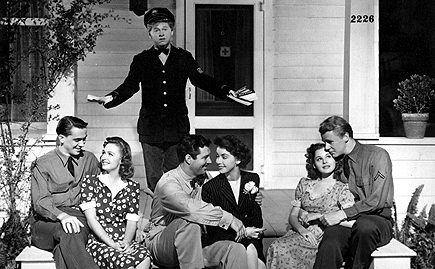Produced for television in 1997 and just released on DVD, director John Frankenheimer‘s three-hour docudrama on the adult life of Alabama governor George Wallace (Gary Sinise), plays like a quality theatrical film, and not just because of impressive production values. A winner of multiple awards, including 2 Golden Globes and 3 Emmys, “George Wallace” is a welcome throwback to the classic biopics of old.
Crafting a screenplay around the life of a historical figure is no easy task. Screen stories demand a three-act structure and reality isn’t always so convenient. For the last couple decades, screenwriters have too often leaned on a stormy marriage or substance abuse – or both – to solve this dilemma, but as last year’s spoof “Dewey Cox,” made clear, this framing device is long past cliché and needs to be retired.
No such thing hampers “George Wallace.” The plot turns where it should, on the emotional life of the character, and even if you’re familiar with the biography upon which the film is based, this approach makes for an engrossing three hours.
Two decades of Wallace’s life are covered, starting with his ill-fated gubernatorial run in 1958. The loss is a bitter one and transforms the populist, liberal Democrat, who’s sympathetic to the plight of blacks, into a divisive, race-baiting segregationist who will never be “out-niggered” again. And he’s not. “Segregation now, segregation tomorrow, segregation forever,” becomes both the theme of the next campaign and the infamous words of his 1963 inauguration speech.
Wallace’s opposition to desegregation does more than put him in the Alabama governor’s chair. It propels him onto the national stage and at odds with Dr. Martin Luther King Jr. and the more progressive Kennedy administration. On June 11th, 1963, in defiance of the federal government, Wallace personally blocks the door of the University of Alabama to stop two black students from enrolling. The beauty of the film is watching how this event turns from the proudest moment of Wallace’s life into the thing that haunts him most.
Even as Wallace preaches the worst kind of division and drags his sick wife (Mare Winningham) from campaign event to campaign event, Gary Sinise’s layered (and Emmy winning) performance never loses sight of what made Wallace a truly tragic figure: his own humanity. That’s not to say the poisonous depths Wallace plumbed to fulfill his ambitions are downplayed, they’re not. Wallace could be a despicable human being. But Sinise never resorts to caricature or loses sight of who the man once was and could be again. The strength of this performance keeps us rooting for Wallace. Not that he succeeds in his obscene ambitions, but that his soul reclaims him and he finds a way back.
The supporting cast all give theatrical-level performances, as well. Mare Winningham won a well deserved Emmy as Wallace’s long-suffering spouse, Angelina Jolie won a Golden Globe for her work as the second wife, and Joe Don Baker is heartbreaking as the father-figure and mentor Wallace betrays in every way imaginable during his climb to the top.
The heart of the film is Archie, a prison trustee assigned to the Governor portrayed by Clarence Williams III. The character is so effortlessly weaved into the script and Williams’s performance such a study of quiet dignity in the face of indignity, when you learn at the end of the film he’s a fictional character conceived to portray the black point of view during this turbulent time, it comes as a surprise.
Ultimately, “George Wallace” is the late John Frankenheimer’s film. The director of such classics as, “The Birdman of Alcatraz,” “The Train,” and the original version of “The Manchurian Candidate,” knows his way around a camera and creates any number of shots that would be impressive in a theatrical film, much less a television one. The scope is equally impressive, much of it created through an artistic use of real footage blended seamlessly into the narrative.
While it’s nice to see how far America has come since Wallace’s time, the film resonates and works on a much deeper level than just race and politics. “George Wallace” is about reaching that time in life when the inventory of your priorities becomes clear. Ambition can be a slow acting poison that catches up in old age, and to look back and see only emotional wreckage, regrets and destroyed relationships is not a fate exclusive to governors who blocked the doors of history.

COMMENTS
Please let us know if you're having issues with commenting.